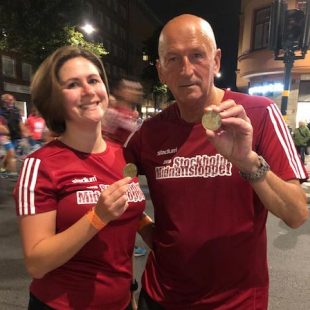Blog
Edit, sleep, run, repeatHow I chose poems for Candlestick Press

Thursday 8th September 2022
Stephen Keeler, guest editor and runner
Ten Poems about Running
I got an ology! (‘He got an ology!’). An ANTH-ology! And a prestigious Candlestick Press anthology at that. What an honour to be trusted with one of these amazing pamphlets. And what joy to realise that you’ve been licensed to romp around the poetry toyshop picking up pretty much anything that takes your fancy and playing with it for a bit to find out whether it’s quite what you’re looking for.
Which begs the question about what it is that one is looking for when compiling a Candlestick Press pamphlet.
I think the poem has to be prime. If the poem isn’t right, it will damage the anthology. In the same way I believe that every single word in a poem has to earn its place there, each of the ten – only ten, aaargh! – each of the ten poems has a lot of weight to carry. In a hefty tome of a hundred or so poems, you might indulge a favourite author or include a poem for a single startling image even if the poem itself is not overall as strong as that one image. In an anthology of only ten poems, there is no hiding place.
Of course, Candlestick Press poems have to be about the subject of the anthology – sheds, tea, getting old. Thus, running. And first to my own shelves before the sometimes wasteland that can be the Internet.
I already knew Helen Allison’s and Carole Bromley’s poems from my reading. I enjoyed the affectionate contradictions they suggested when put side-by-side. I also knew Mandy Sutter’s poignant poem. A good friend of mine, a lifelong runner and a poet himself, recently suffered a couple of injuries which might have ended most other people’s running days forever. When I showed him this selection he commented generously but insisted “I’m not at The Old Trail Runner stage just yet.” Testimony to the power, immediacy and the poignancy of that poem, I think.
There are poets you’d like to see in a Candlestick Press pamphlet, national treasures whose work turns out to be so expensive to include that you look for reasons to rationalise an alternative. And actually, although these pamphlets thrive as much because of the accessibility of the poems as for the attractive format, clear layout and beautiful presentation, they probably don’t need to showcase poets who already comfortably inhabit the popular media.
Back to my bookshelves then, where I find both Mark Granier and Wanda Coleman tussling with existential whispers – an occupational hazard for the often lonely long-distance runner.
My Internet researches threw up powerful and sometimes even violent poems, most often from US poets, where the running is more literally an escape attempt, for example from slavery. These poems were often viscerally disturbing not least because many of them are so well-written. But they are probably not the stuff of a Candlestick Press pamphlet. Partly because they are often not as readily accessible to a casual reader of poetry as my other choices are. Accessibility in poetry should not be a dirty word. Great art is frequently the most accessible art, even if it isn’t always readily ‘understood’. I am not the first to point out that great poems can be read and loved and enjoyed whilst not always being understood.
So, a lot of fun for me, a chance to wield a little power and influence, and a delightful opportunity to write a poem oneself. It has been an utter joy to do this and I am already profoundly envious of the next anthologists who are invited to select Ten Poems about, for Candlestick Press.
